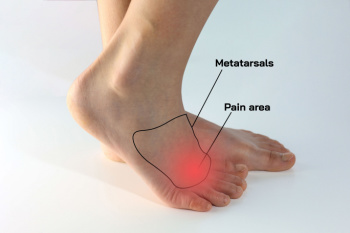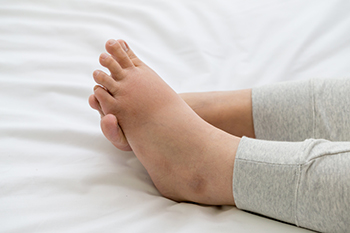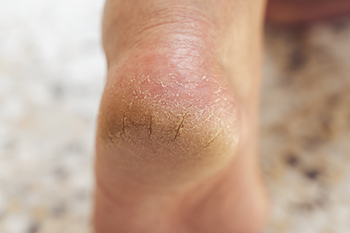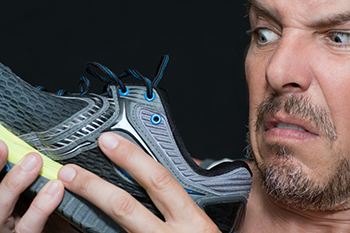Items filtered by date: February 2024
Morton’s Neuroma and Flat Feet

Morton's neuroma is characterized by nerve inflammation or thickening between the metatarsal bones. This condition poses significant discomfort, made worse by wearing ill-fitting shoes or high heels. People with flat feet face an elevated risk of developing Morton’s neuroma because of altered foot mechanics that increase pressure on the nerves. Symptoms of Morton's neuroma include sharp pain between toes and a burning sensation while walking or standing. Numbness, tingling, and inflammation also may be experienced. Diagnostic tools to determine the severity of Morton’s neuroma include musculoskeletal ultrasound, X-rays, and MRIs. Treatment may encompass modifying activity, taking anti-inflammatory medications, and adjusting footwear. A podiatrist may prescribe corticosteroid injections and suggest custom orthotics for additional relief. In some cases, minimally invasive surgical options to remove the neuroma may be necessary. If you are experiencing the above symptoms in the ball of the foot, it is suggested that you make an appointment with a podiatrist for an exam, diagnosis, and treatment options.
Morton’s neuroma is a very uncomfortable condition to live with. If you think you have Morton’s neuroma, contact one of our podiatrists of Foot Doctors of Utica. Our doctors will attend to all of your foot care needs and answer any of your related questions.
Morton’s Neuroma
Morton's neuroma is a painful foot condition that commonly affects the areas between the second and third or third and fourth toe, although other areas of the foot are also susceptible. Morton’s neuroma is caused by an inflamed nerve in the foot that is being squeezed and aggravated by surrounding bones.
What Increases the Chances of Having Morton’s Neuroma?
- Ill-fitting high heels or shoes that add pressure to the toe or foot
- Jogging, running or any sport that involves constant impact to the foot
- Flat feet, bunions, and any other foot deformities
Morton’s neuroma is a very treatable condition. Orthotics and shoe inserts can often be used to alleviate the pain on the forefront of the feet. In more severe cases, corticosteroids can also be prescribed. In order to figure out the best treatment for your neuroma, it’s recommended to seek the care of a podiatrist who can diagnose your condition and provide different treatment options.
If you have any questions, please feel free to contact our offices located in Herkimer, and New Hartford, NY . We offer the newest diagnostic and treatment technologies for all your foot care needs.
Why Does Foot Swelling Occur During Pregnancy?

Foot swelling, or edema, is a common occurrence during pregnancy and can be attributed to various factors. As the body produces more blood and bodily fluids to support the developing fetus, the circulatory system experiences increased pressure, leading to fluid retention in the feet and ankles. Hormonal changes, specifically elevated levels of progesterone, contribute to the relaxation of blood vessels, causing them to dilate and allowing fluid to accumulate in the lower extremities. Additionally, the growing uterus puts pressure on the veins that return blood from the legs to the heart, further impeding circulation and exacerbating swelling. Prolonged standing or sitting, high ambient temperatures, and dietary factors like excessive salt intake can also exacerbate foot swelling at this time. If you are seeking relief options for your swollen feet during pregnancy, it is suggested that you consult a podiatrist who can offer you effective relief techniques.
Pregnant women with swollen feet can be treated with a variety of different methods that are readily available. For more information about other cures for swollen feet during pregnancy, consult with one of our podiatrists from Foot Doctors of Utica. Our doctors will attend to all of your foot and ankle needs.
What Foot Problems Can Arise During Pregnancy?
One problem that can occur is overpronation, which occurs when the arch of the foot flattens and tends to roll inward. This can cause pain and discomfort in your heels while you’re walking or even just standing up, trying to support your baby.
Another problem is edema, or swelling in the extremities. This often affects the feet during pregnancy but tends to occur in the later stages.
How Can I Keep My Feet Healthy During Pregnancy?
- Wearing orthotics can provide extra support for the feet and help distribute weight evenly
- Minimize the amount of time spent walking barefoot
- Wear shoes with good arch support
- Wear shoes that allow for good circulation to the feet
- Elevate feet if you experience swelling
- Massage your feet
- Get regular, light exercise, such as walking, to promote blood circulation to the feet
If you have any questions please feel free to contact our offices located in Herkimer, and New Hartford, NY . We offer the newest diagnostic and treatment technologies for all your foot and ankle needs.
Heel Fissures

Skin fissures are painful cracks that can develop due to dryness and thickened skin. They are common on the heels, often associated with dryness. Fissures can be superficial or deep and may lead to skin ulcers if left untreated. Various factors contribute to skin fissures, including nutritional deficiencies, dry skin conditions, fungal infections, diabetes, and damage to blood vessels. Lifestyle factors like dehydration, frequent washing, climate, profession, and inappropriate footwear can exacerbate dry skin. Treatment depends on the depth of the fissures. Superficial fissures can be managed with daily foot checks, gentle use of a pumice stone, moisturizer application, and protective bandages. Deeper fissures may require debridement, prescription-strength softeners, skin glue, strapping, antibiotics, and heel support. Regular moisturizing and investigating underlying health conditions are vital for effective management and prevention. If you have cracked heels that appear to be worsening, infected, or turning into fissures, it is strongly suggested that you schedule an appointment with a podiatrist for advanced treatment.
Cracked heels are unsightly and can cause further damage to your shoes and feet. If you have any concerns, contact one of our podiatrists from Foot Doctors of Utica. Our doctors can provide the care you need to keep you pain-free and on your feet.
Cracked Heels
Cracked heels appear unappealing and can make it harder for you walk around in sandals. Aside from looking unpleasant, cracked heels can also tear stockings, socks, and wear out your shoes. There are several methods to help restore a cracked heel and prevent further damage.
How Do You Get Them?
Dry skin is the number one culprit in creating cracked heels. Many athletes, walkers, joggers, and even swimmers suffer from cracked heels. Age and skin oil production play a role to getting cracked heels as well.
Promote Healing
Over the counter medicines can help, especially for those that need instant relief or who suffer from chronic dry feet.
Wear Socks – Wearing socks with medicated creams helps lock in moisture.
Moisturizers – Applying both day and night will help alleviate dryness which causes cracking.
Pumice Stones – These exfoliate and remove dead skin, which allows for smoother moisturizer application and better absorption into the skin.
Change in Diet
Eating healthy with a well-balanced diet will give the skin a fresh and radiant look. Your body responds to the kinds of food you ingest. Omega-3 fatty acids and zinc supplements can also revitalize skin tissue.
Most importantly, seek professional help if unsure how to proceed in treating cracked heels. A podiatrist will help you with any questions or information needed.
If you have any questions, please feel free to contact our offices located in Herkimer, and New Hartford, NY . We offer the newest diagnostic and treatment technologies for all your foot care needs.
Keep Your Feet Healthy So You Can Stay Active
Foot Odor Management

Foot odor, or bromodosis, can often be managed by following a few simple steps. It often results from sweat buildup, which fosters bacterial growth on the skin. Fungal infections, like athlete's foot, can also contribute to foot odor. The feet should be kept clean and dry. Toenails should be trimmed and cleaned. Dead skin can be removed by using a foot file to prevent bacterial growth. Socks should be changed daily or more often if an individual sweats heavily. It is also helpful to rotate shoes, allowing them to dry completely between uses. If you have severe foot odor that does not respond to good everyday foot care, it is suggested that you schedule an appointment with a podiatrist for stronger remedies to address the issue.
Everyday foot care is very important to prevent infection and other foot ailments. If you need your feet checked, contact one of our podiatrists from Foot Doctors of Utica. Our doctors can provide the care you need to keep you pain-free and on your feet.
Everyday Foot Care
Often, people take care of their bodies, face and hair more so than they do for their feet. But the feet are a very important aspect of our bodies, and one that we should pay more attention to. Without our feet, we would not be able to perform most daily tasks.
It is best to check your feet regularly to make sure there are no new bruises or cuts that you may not have noticed before. For dry feet, moisturizer can easily be a remedy and can be applied as often as necessary to the affected areas. Wearing shoes that fit well can also help you maintain good foot health, as well as making it easier to walk and do daily activities without the stress or pain of ill-fitting shoes, high heels, or even flip flops. Wearing clean socks with closed shoes is important to ensure that sweat and bacteria do not accumulate within the shoe. Clean socks help to prevent Athlete’s foot, fungi problems, bad odors, and can absorb sweat.
If you have any questions please feel free to contact our offices located in Herkimer, and New Hartford, NY . We offer the newest diagnostic and treatment technologies for all your foot and ankle needs.

